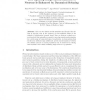Free Online Productivity Tools
i2Speak
i2Symbol
i2OCR
iTex2Img
iWeb2Print
iWeb2Shot
i2Type
iPdf2Split
iPdf2Merge
i2Bopomofo
i2Arabic
i2Style
i2Image
i2PDF
iLatex2Rtf
Sci2ools
ICANN
2007
Springer
2007
Springer
Zero-Lag Long Range Synchronization of Neurons Is Enhanced by Dynamical Relaying
Abstract. How can two distant neural assemblies synchronize their firings at zero-lag even in the presence of non-negligible delays in the transfer of information between them? Here we propose a simple network module that naturally accounts for zero-lag neural synchronization for a wide range of temporal delays. In particular, we demonstrate that isochronous (without lag) millisecond precise synchronization between two distant neurons or neural populations can be achieved by relaying their dynamics via a third mediating single neuron or population.
Distant Neural Assemblies | ICANN 2007 | Millisecond Precise Synchronization | Zero-lag Neural Synchronization |
| Added | 08 Jun 2010 |
| Updated | 08 Jun 2010 |
| Type | Conference |
| Year | 2007 |
| Where | ICANN |
| Authors | Raul Vicente, Gordon Pipa, Ingo Fischer, Claudio R. Mirasso |
Comments (0)

